Fleurs du Mal Magazine


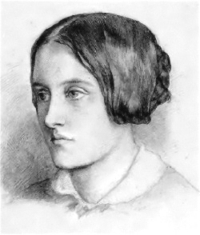
Christina Georgina Rossetti
(1830-1894)
Remember
Remember me when I am gone away,
Gone far away into the silent land;
When you can no more hold me by the hand,
Nor I half turn to go yet turning stay.
Remember me when no more day by day
You tell me of our future that you planned:
Only remember me; you understand
It will be late to counsel then or pray.
Yet if you should forget me for a while
And afterwards remember, do not grieve:
For if the darkness and corruption leave
A vestige of the thoughts that once I had,
Better by far you should forget and smile
Than that you should remember and be sad.
Christina Georgina Rossetti poetry
fleursdumal.nl magazine
More in: Archive Q-R, Rossetti, Christina
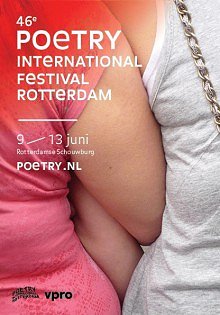 Nominaties C. Buddingh’-Prijs 2015 & Uitreiking tijdens het 46e Poetry International Festival: De jury van de C. Buddingh’-Prijs 2015 nomineert de debuten van Rens van der Knoop, Jeroen van Rooij, Saskia Stehouwer en Runa Svetlikova voor de 26ste C. Buddingh’-Prijs voor het beste Nederlandstalige poëziedebuut van het afgelopen jaar.
Nominaties C. Buddingh’-Prijs 2015 & Uitreiking tijdens het 46e Poetry International Festival: De jury van de C. Buddingh’-Prijs 2015 nomineert de debuten van Rens van der Knoop, Jeroen van Rooij, Saskia Stehouwer en Runa Svetlikova voor de 26ste C. Buddingh’-Prijs voor het beste Nederlandstalige poëziedebuut van het afgelopen jaar.
De jury, bestaande uit Jan Baetens, Hester Knibbe en Marije Koens, kreeg tweeëntwintig debuutbundels onder ogen, een meer dan vorig jaar. De C. Buddingh’-Prijs 2015 wordt op donderdag 11 juni a.s. uitgereikt tijdens het Poetry International Festival Rotterdam.
De genomineerde titels zijn (in alfabetische volgorde):
Rens van der Knoop – Twee mannen spreken elkaar ongemerkt aan
De Bezige Bij Amsterdam
Rens van der Knoop (1987) studeerde Beeld & Taal aan de Rietveld Academie in Amsterdam. Hij stond regelmatig op podia van literaire festivals en publiceerde in Tirade, Mister Motley en Tubelight. Hij werkt aan een muziekencyclopedie.
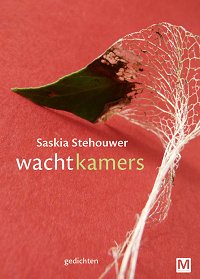 Jeroen van Rooij – Niemand had er enig idee van wat er aan de hand was
Jeroen van Rooij – Niemand had er enig idee van wat er aan de hand was
De Bezige Bij Antwerpen
Jeroen van Rooij (1979) publiceerde in onder meer DW B, nY, Parmentier en op deReactor. Hij schreef eerder de romans De eerste hond in de ruimte (2010) en Het licht (2012), dat op de longlist van de Gouden Boekenuil stond.
Saskia Stehouwer – Wachtkamers
Uitgeverij Marmer
Saskia Stehouwer (1975) studeerde Nederlands en Engels. Haar gedicht Glimp eindigde in 2012 in de top-20 van de Turing Gedichtenwedstrijd. Ze publiceerde eerder gedichten in de Revisor en Awater en was te zien op festivals als Dichters in de Prinsentuin en Crossing Border.
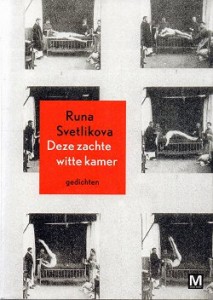 Runa Svetlikova – Deze zachte witte kamer
Runa Svetlikova – Deze zachte witte kamer
Uitgeverij Marmer
Runa Svetlikova (1982) publiceerde verhalen en poëzie in obscure blaadjes en literaire tijdschriften, staat met grote regelmaat op literaire en minder literaire podia en behaalde meer dan eens de top-20 van de Turing Gedichtenwedstrijd. Voor Deze bundel ze de Herman de Conink debuutprijs.
9 – 13 juni 2015 / Rotterdamse Schouwburg
46e Poetry International Festival Rotterdam
Uitreiking C. Buddingh’-Prijs 2015
Donderdag 11 juni, Rotterdamse Schouwburg – Grote Zaal
# website Poetry International
fleursdumal.nl magazine
More in: - Book News, Art & Literature News, MODERN POETRY, Poetry International
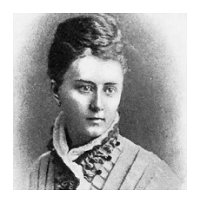
Isabella Valancy Crawford
(1846–1887)
His Mother
In the first dawn she lifted from her bed
The holy silver of her noble head,
And listened, listened, listened for his tread.
‘Too soon, too soon !’ she murmured, ‘Yet I’ll keep
My vigil longer thou, O tender Sleep,
Art but the joy of those who wake and weep!
‘Joy’s self hath keen, wide eyes. O flesh of mine,
And mine own blood and bone, the very wine
Of my aged heart, I see thy dear eyes shine!
‘I hear thy tread; thy light, loved footsteps run
Along the way, eager for that ‘Well done !’
We’ll weep and kiss to thee, my soldier son!
‘Blest mother I he lives! Yet had he died
Blest were I still, I sent him on the tide
Of my full heart to save his nation’s pride!’
‘O God, if that I tremble so to-day,
Bowed with such blessings that I cannot pray
By speech a mother prays, dear Lord, alway
‘In some far fibre of her trembling mind!
I’ll up I thought I heard a bugle bind
Its silver with the silver of the wind. ‘
Isabella Valancy Crawford poetry
fleursdumal.nl magazine
More in: Archive C-D, CLASSIC POETRY
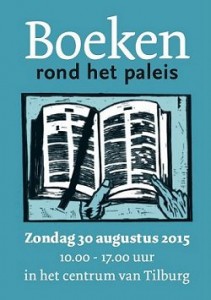 Op zondag 30 augustus 2015 staat het centrum van Tilburg van 10 tot 17 uur opnieuw in het teken van de boekenmanifestatie ‘Boeken rond het Paleis’.
Op zondag 30 augustus 2015 staat het centrum van Tilburg van 10 tot 17 uur opnieuw in het teken van de boekenmanifestatie ‘Boeken rond het Paleis’.
Deze sfeervolle boekenmarkt, georganiseerd door de Stichting dr. P.J. Cools msc, vindt dit jaar voor de 18e keer plaats en is een van de grootste en populairste boekenmarkten van ons land. De markt zal ook dit jaar weer ondersteund worden door een literair en muzikaal programma.
Dit jaar is het 125 jaar geleden, dat Vincent van Gogh overleed (29 juli 1890, Auvers-sur-Oise), en in veel plaatsen die een binding met Van Gogh hebben, zal daaraan aandacht worden geschonken.
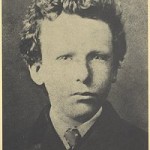 Ook in Tilburg (waar Van Gogh de middelbare school bezocht) zal daar aandacht aan worden besteed.
Ook in Tilburg (waar Van Gogh de middelbare school bezocht) zal daar aandacht aan worden besteed.
Stichting Cools maakte onlangs bekend bezig te zijn met de voorbereidingen van een tweede boekenmarkt: overdekt, in Breda, in januari of februari 2016.
# Volg voor meer informatie de website van stichting Cools
fleursdumal.nl magazine
More in: - Book Lovers, Art & Literature News, Vincent van Gogh, Vincent van Gogh
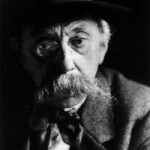
Emile Verhaeren
(1855-1916)
La Pluie
Longue comme des fils sans fin, la longue pluie
Interminablement, à travers le jour gris,
Ligne les carreaux verts avec ses longs fils gris,
Infiniment, la pluie,
La longue pluie,
La pluie.
Elle s’effile ainsi, depuis hier soir,
Des haillons mous qui pendent,
Au ciel maussade et noir.
Elle s’étire, patiente et lente,
Sur les chemins, depuis hier soir,
Sur les chemins et les venelles,
Continuelle.
Au long des lieues,
Qui vont des champs vers les banlieues,
Par les routes interminablement courbées,
Passent, peinant, suant, fumant,
En un profil d’enterrement,
Les attelages, bâches bombées ;
Dans les ornières régulières
Parallèles si longuement
Qu’elles semblent, la nuit, se joindre au firmament,
L’eau dégoutte, pendant des heures ;
Et les arbres pleurent et les demeures,
Mouillés qu’ils sont de longue pluie,
Tenacement, indéfinie.
Les rivières, à travers leurs digues pourries,
Se dégonflent sur les prairies,
Où flotte au loin du foin noyé ;
Le vent gifle aulnes et noyers ;
Sinistrement, dans l’eau jusqu’à mi-corps,
De grands bœufs noirs beuglent vers les cieux tors ;
Le soir approche, avec ses ombres,
Dont les plaines et les taillis s’encombrent,
Et c’est toujours la pluie
La longue pluie
Fine et dense, comme la suie.
La longue pluie,
La pluie — et ses fils identiques
Et ses ongles systématiques
Tissent le vêtement,
Maille à maille, de dénûment,
Pour les maisons et les enclos
Des villages gris et vieillots :
Linges et chapelets de loques
Qui s’effiloquent,
Au long de bâtons droits ;
Bleus colombiers collés au toit ;
Carreaux, avec, sur leur vitre sinistre,
Un emplâtre de papier bistre ;
Logis dont les gouttières régulières
Forment des croix sur des pignons de pierre ;
Moulins plantés uniformes et mornes,
Sur leur butte, comme des cornes
Clochers et chapelles voisines,
La pluie,
La longue pluie,
Pendant l’hiver, les assassine.
La pluie,
La longue pluie, avec ses longs fils gris.
Avec ses cheveux d’eau, avec ses rides,
La longue pluie
Des vieux pays,
Éternelle et torpide !
Les Villages illusoires, 1895
Emile Verhaeren poetry
fleursdumal.nl magazine
More in: Archive U-V, Verhaeren, Emile
Met één schoen in de hand hinkte de slager terug naar de varkens, die hij bij de pompbak had achtergelaten. Tevreden. Hij had die gek getoond wie er in werkelijkheid kampioen van Solde was. Ingemaakt had hij hem! Als Kaffa ervan geleerd had, zou hij voorlopig zijn gezicht niet meer in het dorp laten zien. Maar de vier oude mannen, die het spel vanuit de caféhof hadden gevolgd, schudden misprijzend hun hoofd. Die ene keer dat de slager gewonnen had, maakte nog geen kampioen van hem. Eén verlies mocht je niet tellen. Die Kaffa was vandaag duidelijk niet in de stemming om zich waar te maken. In een echte wedstrijd zou de slager geen kans hebben gehad. Tegen de precisie van de gek kon niemand op. Als hij op zijn best was, veegde hij met iedereen de vloer aan. Céleste, die altijd gevolgd werd door de ogen van iedereen op het plein, bracht Kaffa een fles bier. Ze nam geen notitie van Jacob Ramesz, die het water uit de mond liep toen hij de fles zag. Die echter niet voor hem bestemd was. Waarnaar hij alleen mocht kijken. Omdat hij geen cent op zak had. En omdat hij niks met die cafémeid aan het handje had, al zou hij zijn leven ervoor willen geven om nog eens op zo'n meid te kunnen liggen. Hij verbeet zich van afgunst en vervloekte zijn lot toen Kaffa de fles aan de mond zette en dronk. Daarbij schoot de adamsappel van de zwerver als een stuiter in zijn keel op en neer. Jacob balde zijn vuisten in zijn zakken en trapte in de richting van opoe Ramesz, zijn seniele wijfje. En ook al raakte hij haar niet, zo'n trap luchtte lekker op.
De kerkklok, die bastaard met zijn geluid van een gescheurde emmer,
sloeg twaalf uur. Middag. Daarna vaag gebeier dat het Angelus moest
verbeelden. Een dankgebed aan de Heer der Vruchtbaarheid voor het
eten dat Hij bij velen in de loop van de dag op tafel zou brengen.
Echter niet bij Jacob Ramesz.
Die bleek ook deze dag weer God niet welgevallig. Jacob had geen
kruimel in huis en piekerde zich het hoofd suf hoe vandaag weer aan
eten te komen voor hem en het mensje in haar stoel. In zijn kelder
waren de muizen allang van honger en ellende omgekomen. Het Angelus
hoefde hem niet aan eten te herinneren, wel was het voor hem het sein
om zich languit op de houten bank onder het gevelraam van zijn huis
neer te vlijen. Zijn hoofd wat achterover tussen de uitdrogende
geraniums die van de vensterbank omlaag hingen, om zo vrij te kunnen
boeren. Dat was hij nog gewend uit de tijd dat hij zich rond het
middaguur zo vol vrat dat hij geen pap meer kon zeggen. Toen er nog
geld in de knip was. Ondanks zijn honger viel hij toch in slaap.
Droomde van vlooien als koeien zo groot. Van tafels vol eten. Van
kannen bier. Er tekende zich een tevreden glimlach rond zijn anders
zo stuurs vertrokken gezicht. In zijn slaap was hij weer helemaal de
oude. Het wilde beest dat zuipend en naaiend door het leven ging. Als
hij sliep, was Jacob nog op zijn best. Dan was hij het lege gevoel in
zijn maag kwijt, ook al stond zijn buik zo hol als een hazenleger.
Opoe Ramesz, die altijd in een toestand tussen werkelijkheid en droom
verkeerde, leek nu definitief voor de droom te kiezen. Haar hoofd
viel scheef. Uit haar mond zakte haar tong nog wat verder naar
buiten.
Een meikever streek besluiteloos op haar kin neer en veegde zijn poten glad.
Dat beest leek helemaal van slag. Wat zocht zo'n diertje nog op opoes kin
tegen eind augustus terwijl het in mei al onder de grond hoorde te zitten om eitjes te
leggen? Plotseling zag de kever het donkere gat van opoes mond. Omdat
het beestje toch óóit zou moeten onderduiken, trok het met gevouwen
vleugels haar mond binnen en verdween dapper achter haar tandvlees.
Opoe werd er niet wakker van. Dat hapje was meegenomen. Als ze sliep,
dan sliep ze vast.
Ton van Reen: Landverbeuren (36)
wordt vervolgd
fleursdumal.nl magazine
More in: - Landverbeuren, Reen, Ton van
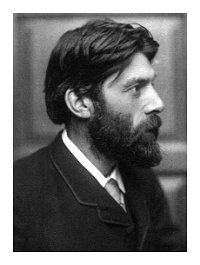
Robert Bridges
(1844 – 1930)
The Evening Darkens Over
The evening darkens over
After a day so bright,
The windcapt waves discover
That wild will be the night.
There’s sound of distant thunder.
The latest sea-birds hover
Along the cliff’s sheer height;
As in the memory wander
Last flutterings of delight,
White wings lost on the white.
There’s not a ship in sight;
And as the sun goes under,
Thick clouds conspire to cover
The moon that should rise yonder.
Thou art alone, fond lover.
Robert Bridges poetry
fleursdumal.nl magazine
More in: Archive A-B, Bridges, Robert
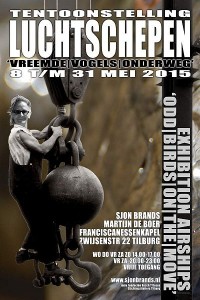 Sjon|Brands
Sjon|Brands
TENTOONSTELLING LUCHTSCHEPEN
‘Vreemde|Vogels|Onderweg’
vrijdag 8 t/m zondag 31 mei 2015
Woensdag t/m zondagmiddag 14.00 – 17.00 uur, vrijdag en zaterdagavond 20.00 – 23.00 uur
Franciscanessenkapel, Bisschop Zwijsenstraat 20 te Tilburg, ingang parkje tussen 20 en 24
‘Vreemde|Vogels|Onderweg’ is een uitbundige tentoonstelling gevleugelde luchtschepen. Vijf gevederde luchtpaleizen, weelderige droomvogels bezaaid met buitenissige bouwwerkjes en vreemde vogelmensjes. Vijf groteske kathedralen van een op hol geslagen fantasie. Oftewel een mensheid vertolkt in kleine verhaaltjes en humor.
Het zijn speelse constructies opgebouwd uit een vindingrijk hergebruik van gebruiksvoorwerpen en wegwerpmaterialen, een zwevend rijk van veren, theezeefjes, lampen, flessen, schakelaars, tandwielen, borsteltjes, melkkannetjes, gordijnringen, bougies, schedeltjes, enzovoort. Wat men thuis en buiten tegenkomt bewerkt tot een bos bonte karikaturen van het menselijk bestaan.
Met deze expositie toont de Tilburgse kunstenaar Sjon Brands voor het eerst zijn nieuwe luchtschepen, eigenzinnige werk waar hij de afgelopen twee en een half jaar onafgebroken aan heeft gewerkt. Bergen metaal, hout, glas, steen, porselein, duizenden labeltjes en tienduizenden veren zijn allengs omgetoverd tot een vrolijk landschap dada-droomwerelden in 3D.
Deze tentoonstelling luchtschepen gaat vergezeld van een expositie van de schilder Martijn de Boer, die zijn nieuwe serie kinderportretten laat zien, getiteld ‘Young Bishops’. De vlot geschilderde werken in acryl op papier zijn gebaseerd op sepia klassenfoto’s van rond 1920, waarop kinderen zijn uitgedost in hun zondagse kleren, vaak bang voor de camera en soms kaalgeschoren vanwege de luizen. Het palet van Martijn de Boer is bewust beperkt tot aardetinten: zwart, wit, oker en gebrande sienna. We zien kanten kraagjes en strikjes in het haar, attributen van kinderlijke onschuld. Desondanks ontwaart de kijker al snel dat er meer aan de hand is.
zondagmiddagprogramma
Tijdens de zondagmiddagen is er een aantrekkelijk programma ‘Anna Blume hat ein Vogel’ met gerenommeerde ‘vreemde vogels’ uit de wijde omgeving van Tilburg. Aanvang 15.00 uur.
rondleidingen scholen
Door de week zijn er voor groepen uit het lager en middelbaar onderwijs gratis rondleidingen, mits vooraf afgesproken. De belangstelling is groot, wees tijdig met uw aanmelding: 013 5358041.
Deze expositie kwam tot stand m.m.v. ‘Fundación ‘Bosch Y Bosco’ en ‘Stichting Ateliers Tilburg’.
De toegang is gratis en u bent natuurlijk van harte welkom. Kinderen onder begeleiding.
Informatie en programma, zie: www.sjonbrands.nl
fleursdumal.nl magazine
More in: Art & Literature News, Brands, Sjon, Sjon Brands, Theater van de Verloren Tijd
 Virginia Woolf
Virginia Woolf
(1882-1941)
3. Monday or Tuesday
(from: Monday or Tuesday)
Lazy and indifferent, shaking space easily from his wings, knowing his way, the heron passes over the church beneath the sky. White and distant, absorbed in itself, endlessly the sky covers and uncovers, moves and remains. A lake? Blot the shores of it out! A mountain? Oh, perfect — the sun gold on its slopes. Down that falls. Ferns then, or white feathers, for ever and ever —
Desiring truth, awaiting it, laboriously distilling a few words, for ever desiring —(a cry starts to the left, another to the right. Wheels strike divergently. Omnibuses conglomerate in conflict)— for ever desiring —(the clock asseverates with twelve distinct strokes that it is midday; light sheds gold scales; children swarm)— for ever desiring truth. Red is the dome; coins hang on the trees; smoke trails from the chimneys; bark, shout, cry “Iron for sale”— and truth?
Radiating to a point men’s feet and women’s feet, black or gold-encrusted —(This foggy weather — Sugar? No, thank you — The commonwealth of the future)— the firelight darting and making the room red, save for the black figures and their bright eyes, while outside a van discharges, Miss Thingummy drinks tea at her desk, and plate-glass preserves fur coats —
Flaunted, leaf — light, drifting at corners, blown across the wheels, silver-splashed, home or not home, gathered, scattered, squandered in separate scales, swept up, down, torn, sunk, assembled — and truth?
Now to recollect by the fireside on the white square of marble. From ivory depths words rising shed their blackness, blossom and penetrate. Fallen the book; in the flame, in the smoke, in the momentary sparks — or now voyaging, the marble square pendant, minarets beneath and the Indian seas, while space rushes blue and stars glint — truth? content with closeness?
Lazy and indifferent the heron returns; the sky veils her stars; then bares them.
Monday or Tuesday, by Virginia Woolf
3. Monday or Tuesday
fleursdumal.nl magazine
More in: - Monday or Tuesday, Archive W-X, Woolf, Virginia
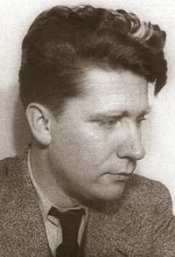
Hendrik Marsman
(1899-1940)
Paradise regained
De zon en de zee springen bliksemend open:
waaiers van vuur en zij;
langs blauwe bergen van den morgen
scheert de wind als een antilope
voorbij.
Zwervende tussen fonteinen van licht
en langs de stralende pleinen van ‘t water,
voer ik een blonde vrouw aan mijn zij,
die zorgeloos zingt langs het eeuwige water
een held’re, verruk’lijk-meeslepende wijs:
‘Het schip van den wind ligt gereed voor de reis,
de zon en de maan zijn sneeuwwitte rozen,
de morgen en nacht twee blauwe matrozen –
wij gaan terug naar ‘t Paradijs.’
Hendrik Marsman poetry
fleursdumal.nl magazine
More in: Archive M-N, Marsman, Hendrik
Jo Glanville: The Charlie Hebdo principle (PEN director Jo Glanville responds to the withdrawal of six writers from PEN American Center’s annual gala over their decision to honour Charlie Hedbo)
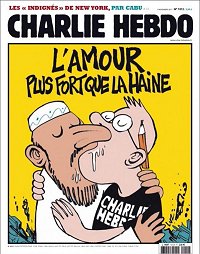 The distaste of eminent writers such as Peter Carey at PEN American Center’s decision to honour Charlie Hebdo at its gala next month, highlights once again the fundamental inconsistency that underpins attitudes towards free speech. Within days of the ‘Je Suis Charlie’ outpouring of solidarity, French police were arresting citizens for glorifying terrorism, while David Cameron’s government was busy pushing a counter terrorism bill through Parliament that would severely curtail universities’ liberty as a forum for freedom of expression. We may be used to the double standards of politicians, but what about writers?
The distaste of eminent writers such as Peter Carey at PEN American Center’s decision to honour Charlie Hebdo at its gala next month, highlights once again the fundamental inconsistency that underpins attitudes towards free speech. Within days of the ‘Je Suis Charlie’ outpouring of solidarity, French police were arresting citizens for glorifying terrorism, while David Cameron’s government was busy pushing a counter terrorism bill through Parliament that would severely curtail universities’ liberty as a forum for freedom of expression. We may be used to the double standards of politicians, but what about writers?
Becoming a member of PEN (one of the oldest human rights organisations in the world, and the largest international community of writers) means pledging ‘to oppose any form of suppression of freedom of expression in the country and community to which [writers] belong, as well as throughout the world wherever this is possible’. That’s a sentiment one would hope any writer might be happy to support and PEN depends, on a regular basis, on its members speaking out and standing up for fellow writers at risk. That’s the source of its influence and moral authority.
One of the writers, Francine Prose, a former PEN President, who decided to withdraw from the gala in protest, was reported as saying that giving an award signified ‘admiration and respect’ for the winner’s work. ‘I couldn’t imagine being in the audience when they have a standing ovation for Charlie Hebdo.’ But Charlie Hebdo is in fact being recognised for its courage: the courage to publish in the face of threats and intimidation, and the courage to continue publishing after the shocking murders in January.
We are more used to seeing that courage at a greater distance – in Mexico, Russia, Bangladesh or Egypt – and feel safe celebrating writers and journalists who may be prosecuted for outraging public morals in their own culture.
On our own doorstep, when faced with a satirical publication that provokes and offends, there is an underlying view implicit in the protest of Peter Carey and fellow writers that this kind of speech is not worth defending. Carey questioned whether it even was a freedom of expression issue; the writer Deborah Eisenberg voiced concerns (as have many others) about Charlie Hebdo’s ‘denigrating portrayals of Muslims’. Yet one of the most important, if uncomfortable, responsibilities for any free speech advocate is to defend the right to express speech which may be shocking, disturbing or offensive. Without that broad defence, the limits of everyone’s speech, as well as writers and publishers, are at risk of being restricted to suit the political agenda or prevailing morality, at a cost to artistic licence as well as individual freedom.
 Most of the great free speech battles in history have been fought over issues that were not deemed deserving of defence. The subjects of the famous obscenity prosecutions of the 70s in the UK (the Oz trial or Linda Lovelace’s memoir) were seen as publications of no merit. But what was at stake, as in the case of Charlie Hebdo, was the principle: the freedom to publish and the freedom to write. A freedom on which all writers depend. Victory in court (in the face of moral outrage) led to greater freedom for publishers and writers. In one of his last interviews, the writer and barrister John Mortimer, who famously defended both the Oz and the Lovelace trials, spoke of the retreat from ‘the abiding principle … that you lived in a country where you could read anything you like’. The growth of the idea that we should at all costs avoid causing offence (and that this may be even more important than defending the right to free speech) continues to undermine that principled protection for freedom of expression.
Most of the great free speech battles in history have been fought over issues that were not deemed deserving of defence. The subjects of the famous obscenity prosecutions of the 70s in the UK (the Oz trial or Linda Lovelace’s memoir) were seen as publications of no merit. But what was at stake, as in the case of Charlie Hebdo, was the principle: the freedom to publish and the freedom to write. A freedom on which all writers depend. Victory in court (in the face of moral outrage) led to greater freedom for publishers and writers. In one of his last interviews, the writer and barrister John Mortimer, who famously defended both the Oz and the Lovelace trials, spoke of the retreat from ‘the abiding principle … that you lived in a country where you could read anything you like’. The growth of the idea that we should at all costs avoid causing offence (and that this may be even more important than defending the right to free speech) continues to undermine that principled protection for freedom of expression.
Salman Rushdie, a notable supporter of English PEN and the PEN American Center, who has excoriated the withdrawal of Carey and others from the gala, was similarly criticised 26 years ago for causing gratuitous offence (by fellow writers) after the fatwa. Roald Dahl even called him a dangerous opportunist. There may be ‘good faith differences of opinion within our community’ as PEN American Center generously acknowledged on Sunday but it’s in the interests of all writers to stand up for the principle.
Jo Glanville is director of English PEN
(This piece first appeared in The Bookseller (28 April 2015). Source: website English PEN)
# More information on website English PEN
fleursdumal.nl magazine
More in: Art & Literature News, LITERARY MAGAZINES, PRESS & PUBLISHING, REPRESSION OF WRITERS, JOURNALISTS & ARTISTS
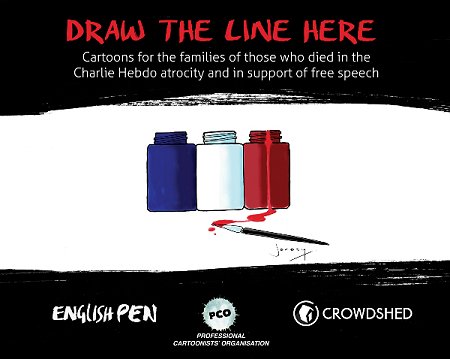
Draw the Line Here: Cartoonists respond to the Charlie Hebdo killings. Cartoons for the families of the victims of the Charlie Hebdo attacks, and in support of free speech.
English PEN is delighted to announce the publication of Draw The Line Here, a collection of cartoons drawn in response to the Charlie Hebdo attacks in Paris in January 2015.
The book is a collaboration between the Professional Cartoonists’ Organisation (PCO), Crowdshed, and English PEN. It features cartoons drawn by British artists in the days immediately after the attacks. The work of 66 cartoonists is featured, including Steve Bell, Dave Brown, Martin Rowson, Peter Brooke and Ralph Steadman.
 Proceeds from the book will be split equally between the fund for the victims of the Charlie Hebdo murders, and English PEN’s Writers at Risk programme.
Proceeds from the book will be split equally between the fund for the victims of the Charlie Hebdo murders, and English PEN’s Writers at Risk programme.
Production of the book was made possible by a crowd-funding campaign launched in February. Over 200 people pledged their support to the project, and will be receiving their copies of the book in the coming days.
Draw The Line Here includes a foreword by Libby Purves, patron of the PCO, who writes:
Some cartoons here are gentle, others savage; some merely encapsulate the bafflement and sadness of a world where mockery is met not with the proper response, a shrug, but with murder. Again and again the theme is of the fragility of the sceptical, laughing pencil: its simplicity and its splendour, the opposite of the vainglorious, meaningless squalor of the gun and the bomb.
Jo Glanville, director of English PEN, said:
We are extremely grateful to the PCO and to Crowdshed for choosing English PEN as a beneficiary of this project, and of course to all the cartoonists who have contributed to the book. By exercising their own right to freedom of expression, these artists are helping to defend the free speech of others.
The publication of this book could not be more timely. Sunday 3 May is World Press Freedom Day, the perfect time to stand in solidarity with Charlie Hebdo.
Draw The Line Here may be purchased online at: www.englishpen.org/campaigns/draw-the-line-here
Supporters to the Crowdfunding campaign will receive their copies in the coming days
Books cost UK £15.00 each. UK delivery is £2.00 and international delivery is £4.00.
# More information on website English PEN
fleursdumal.nl magazine
More in: - Book News, Art & Literature News, LITERARY MAGAZINES, PRESS & PUBLISHING, REPRESSION OF WRITERS, JOURNALISTS & ARTISTS
Thank you for reading Fleurs du Mal - magazine for art & literature